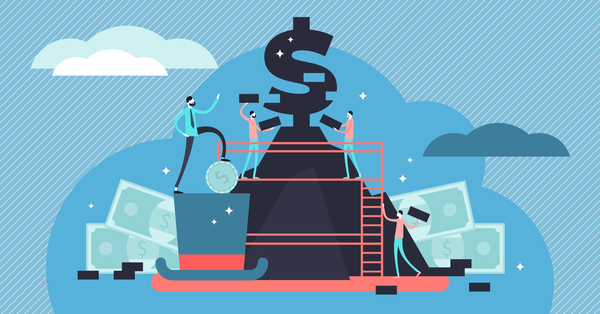
Although it is true that the Old Paradigm seeks to control the economy in every way possible, this is more about how the powers that be exert control through the economy, using money as a means rather than an end. This type of cultural manipulation can be seen in many ways, but to uncover the truth we will explore the two manifestations most relevant today─ profits over people, and economic discrimination. By seeing the true driving forces behind the current economic conditions, it will become painfully evident that not only is greed at the forefront of financial decisions, but an insatiable hunger for control is also involved; a hunger that consumes freedom, democracy and countless lives along the way.
Profits Over People
As I write this, the global pandemic known as COVID-19 has been raging for over a year, changing life in almost every way imaginable. Needless to say, as restrictions become stricter, and as jobs become increasingly jeopardized, the economy is shrinking in a very real and obvious way. Subsequently, many businesses are suffering, even to the point of bankruptcy, causing countless people to lose their jobs as a result. This isn’t a case of Old Paradigm values vs New Paradigm values. Rather, this is just the nature of economic systems failing under the pressures of a global crisis unlike any other in recent history.
However, this isn’t the issue that needs to be addressed here. It’s not the struggling industries that are under scrutiny for cutting jobs or taking whatever measures are necessary in order to survive. Such decisions, as unfortunate as they may be, are usually a matter of making sacrifices for the greater good. Instead, this is about the businesses that are continuing to see a profit that are cutting jobs and reducing payroll in an attempt to increase that profit further still.
Believe it or not, there are companies doing that very thing─ cutting jobs in order to increase profits during this devastating time. Corporate executives are signing off on downsizing initiatives in order to show growing profit margins in spite of economic hardship. Again, this isn’t about cutting jobs in order to survive, or getting rid of unnecessary positions to eliminate wasteful spending. Instead, this is a move to streamline personnel, regardless of performance, experience, or productivity, so that already existing profits are made even greater. In other words, it is taking money from honest, hardworking people in the midst of a global crisis, in order to ensure the rich are made even richer.
At first glance this may be seen as nothing more than unapologetic greed, an attempt to grab more money without any concern for those being kicked to the curb, literally as well as figuratively. After all, greed is nothing new, and those with money have never had concern for those without. That is just part and parcel of the ‘dog eat dog’ world we have been born into. However, if you take a closer look another element comes to view. And this element is, in a way, far more monstrous in nature than the untempered greed that we are all accustomed to.
The simple truth is that cutting jobs in an environment where profits are already strong is less about greed and more about control. After all, under normal circumstances such measures would be seen as unnecessary, even dangerous in terms of reputation. But as you well know, these aren’t normal circumstances. The world has been virtually turned upside down as a result of the pandemic, not just in terms of economics, but in many other ways as well. Political and social unrest are at all time highs, with millions of people desperate to just survive these times of uncertainty. In other words, the world as we know it is seemingly spiraling out of control with no end in sight.
And here is where the true motivation behind cutting jobs for increased profits can be seen. The fact that the pandemic and its impact on life is out of our control is something that the powers that be cannot abide by. After all, control is the very heart of the Old Paradigm. Therefore, the more out of control things are, the more control has to be taken back. But how do you restore that feeling of control in a world of uncertainty? By taking whatever measures are necessary to prove that your actions can still have immediate and noticeable results. If you can’t increase profits by driving sales, then do it by cutting jobs. Sure, the people you fire may have given you years of service. They may have been performing to the very highest levels even. But it’s not about them, and it never has been. It’s about control. It’s about being in charge. So cut those jobs, and let’s watch as we earn a few more dollars at the expense of those whose lives have just been ruined.
No, this isn’t greed. This is an unquenchable lust for control. Needless to say, I’m not arguing that the rich owe the average person money in times of hardship. Nor am I suggesting that companies should do the ‘right thing’ at any cost, including sustaining heavy financial losses. Instead, I am suggesting that cutting jobs to increase an already vibrant profit margin, in such dire times, is nothing short of pathological. No decent person, let alone a boardroom of persons, would ever agree to cutting jobs that aren’t extraneous for marginal gains at best. Least of all during a time when people are scared, suffering, and even dying as a result of the global crisis at hand. This is evil personified, and no amount of misguided self-justification will ever cleanse the souls of those behind such decisions of the misery and suffering they have caused.
Economic Discrimination
The idea of profit over people being more than a symptom of unfettered greed may seem a bit of a stretch, especially if it were the only example where money was used to exert control. However, once you begin to view economic conditions through the lens of control-driven values then the true nature of things becomes increasingly clear. Money has become more than a means of measuring value or granting a person the ability to buy goods and services. It has become the very currency of power itself. That is why controlling money is all-important. Simply put, the person who controls the most money possesses the most power.
One of the easiest ways to demonstrate this truth is by looking at economic disparity. The income of the average person has remained stagnant for the last few decades, while that of the upper tiers of society has seen exponential growth. In turn, the power of the ordinary person in terms of affecting social or political change has all but evaporated, whereas the ultra-wealthy are enjoying an unprecedented era of immeasurable and unrestricted influence.
However, perhaps the greatest evidence of control through finance can be seen in terms of gender and racial discrimination. The simple truth is that women make less than men in countless jobs, even in the most ‘advanced’ societies in this modern era. Such income disparity cannot be attributed to greed, as it makes no sense to profit off of female employees more so than their male counterparts, especially in areas where men form the majority of the labor pool. Since profit isn’t the issue, then there can only be one other motivating factor─ control.
The truth is that paying women less money ensures they always have less power than men. Although they may not be as reliant on men as in the days when women were barely allowed to work, they still carry a certain ‘second class’ status, one that sees them as perpetually less significant due to their gender. The fact that this discrimination is allowed to continue to this day demonstrates the ingrained nature of the patriarchal society we have come to take for granted. And, in an age where women are gaining more than just a foothold in the political arena, it can be seen as a last-ditch effort to ‘keep women in their place’. The fact that there is gender-based income inequality is nothing short of disgusting and shameful, and it begs the question how people can still sing the words ‘land of the free and home of the brave’ when such despicable conditions continue to exist.
Needless to say, gender discrimination is not the only example of oppression that comes from controlling the economy. Just as women are paid less than men for the same job, so too, people of other racial backgrounds make less than their Caucasian counterparts. To base a person’s income on anything but their skills, experience and potential is not just immoral, it’s simply bad business. But yet it continues in almost every industry, affecting countless people around the world, proving that there is more than simple greed behind the modern economic model.
In the end, there can be no question that the economy is used to directly exert control over the masses. Whether wealth is used to influence politics, or low wages and income discrimination is used to maintain the balance of power, money has become one of the main weapons in the arsenal of control-driven values. Fortunately, as the New Paradigm takes shape, these weapons will be replaced by the tools needed to cultivate compassion-driven values in a society defined by evolved human consciousness.
